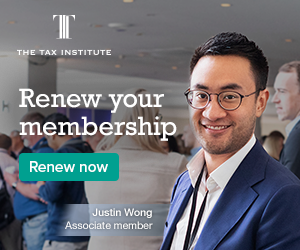before making the choice.
Consider your key personal learning goals. Are they academic, professional or both?
Academic: Do you want to gain an academic, qualification or are you looking to learn more about specific topics in Australian tax law?
Professional: Is your learning goal around advancing your career or being recognised in your profession with a designation or status? Do you want to build your network by learning with fellow professionals? Do you want to learn from experts in your field? Do you want to develop skills beyond technical elements of the tax law e.g. improving your tax research, advisory communication and business writing skills?
skills are you looking to develop?
significant subject matter knowledge But this expertise needs to be
complemented by effectiveness in building relationships through communication,
providing effective and value-adding advice, and keeping abreast of
developments in your field.
qualifications and certifications, and informally through hands-on, real-life
experiences and from others you interact with throughout your career.
especially if you are seeking financial funding from your employer to pay for
your development.
chosen program, in addition to any qualification or designation? Are the learning
resources e.g. examples and case studies, used in the program, reflective of
real-life situations? What are the relevant skills you can expect to possess on
completion of the program?
with you to demonstrate the quality of the program content and the value to you
of completing it, and the value you can then add to your employer or your own business.
advice by becoming a Chartered Tax Adviser. Enrolments close soon.
For example, the programs at The Tax Institute develop your up-to-date, tax technical knowledge of course, however they also provide you with the opportunity to develop skills beyond technical elements of the tax law e.g. by improving your tax research capabilities, your ability to provide valuable advice to clients through effective communication and your business writing skills.
The programs at The Tax Institute are developed and delivered by tax experts in their fields and tax law academics. This ensures academic integrity as well as a practical focus relevant for your work in the profession.
3. How much support can
you get from your program provider?
on the go’ and ‘just-in-time’ learning which trends show learners are
demanding. But this can also mean less contact hours as you learn.
What sort of learning experience do you want? Are you comfortable
with an online environment for your learning? Do you prefer to learn in a
physical face-to-face situation? Or do you need other options?
to self-manage? And what support are you likely to need from the program
provider?
provider offers which accommodate your particular needs. Do you have individual circumstances that
your provider should know about and support you with? What happens if you have
a question or don’t understand something?
point for you for administrative support that is separate from the contact for
queries about the program content? Can you find support from your fellow
learners in an online forum?
supporting you through your learning, dealing with unexpected circumstances or
making sure you have the same chance of success as any other learner in the
program? The Tax Institute has established Candidate support and Candidate Care
policies and various mechanisms to accommodate individual circumstances to
ensure learners have access to the support they need for success.
– does it fit with you?
you need lots of structure and reminders of deadlines? Or do you prefer more
flexibility and self-management of deadlines? Can you work with either?
 You probably have multiple priorities to juggle. Does the
You probably have multiple priorities to juggle. Does the
program provider enable you to access the content in ways that allows you to
learn as you want to, while still providing a sense of overall structure and
progression? At The Tax Institute we have seen candidates increasingly making
use of our online learning environment with materials accessible on their devices
at a time and a place that suits them.
reminders to keep you on track. Others leave more of the planning to you. It’s
important to know from the outset that the program you’re enrolling in can accommodate your preferences.
Research the
program options for delivery modes and understand how flexible you can be with
deadlines and schedules. While there are necessary deadlines for learning at The
Tax Institute, the programs we offer are capable of being undertaken in a way
that puts you in the driving seat, with the ability to note the reminders if
you need to.
benefits or resources to help you?
and stay up to date with the changing tax environment.
such as The Tax Institute, is likely to give access
to many additional resources and benefits of membership.
Monthly digital journal - Taxation in Australia
Weekly TaxVine email & fortnightly
‘Insiders’ email
Monthly Tax Update webinars (for voting members)
Access to the Young Practitioners Mentoring
Program
Monthly technical papers
Member rates on other development events (over
300 professional development events nationally), products and subscriptions
could add to the outcomes you will achieve from participating in the program,
the meeting of the learning goals you have and the progression of your career.









